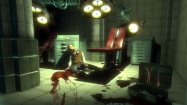As video games have grown up from arcade shooters and text based adventure games to Massively Multiplayer Online Role Playing Games (MMORPGs) and motion-detecting games of all genres, so too has the field of discussion on the subject. Writers world wide are theorizing on what games do, how they do it, and what they should be doing.
Academia is beginning to develop a sizable body of opinions on video games, moving far beyond simply addressing the violence associated with playing games. The big scholarly issue many people are addressing is whether or not games can tell stories, and if they do then what kind of narrative it is, or in what way is it told, a complex discussion situated amongst conflicting sources and academics.
So why study video games? Are they even worthy of academic thought? Do they produce anything meaningful? These are questions that have been debated since the birth of video games as an innovative mode of entertainment. Yet when watching someone play a game, it is obvious that the player is not simply seeing units in a program.
Games are not simply a form of entertainment either. Games are a mode of interaction, of expressing something about ourselves, both for the player, designer, and onlooker. They shape how we see the world by looking at how others see it.
Reading a book can make you laugh, cry, and forget it’s only a story. Watching a movie and playing a game can produce the same reactions, a game arguably even more so because of the high level of audience participation. Playing a game can make you think ‘Oh, I never thought of it that way.’ Playing a game lets people literally get into a story and even help tell it. Finally, digital technologies represent a growing medium for storytelling, and they may be the future of narratives.
Filed under: Education, Games, Video Games | Tagged: academia, entertainment, Games, genre, Narrative, stories, story telling, Video Games, writing | Leave a comment »


 Some games have badass fighting systems, like Borderlands. Some are fun for questing and grinding, like World of Warcraft. I was surprised to find an FPS with a story that shocked me and made me laugh AND had cool combat. Bioshock is an FPS released in 2007 for PC/360/PS3 by Irrational Games and 2K Games. It has been lauded as a great game, for its “morality-based” storyline, immersive environment and Ayn Rand-inspired dystopian back-story” (
Some games have badass fighting systems, like Borderlands. Some are fun for questing and grinding, like World of Warcraft. I was surprised to find an FPS with a story that shocked me and made me laugh AND had cool combat. Bioshock is an FPS released in 2007 for PC/360/PS3 by Irrational Games and 2K Games. It has been lauded as a great game, for its “morality-based” storyline, immersive environment and Ayn Rand-inspired dystopian back-story” (
 And of course to defeat these enemies, you get to use the same plasmids. Send bees to attack your enemies, freeze and shatter them, or set them on fire. Or, use the many fun weapons and changeable ammo, from a simple wrench or revolver to the chemical thrower or crossbow.
And of course to defeat these enemies, you get to use the same plasmids. Send bees to attack your enemies, freeze and shatter them, or set them on fire. Or, use the many fun weapons and changeable ammo, from a simple wrench or revolver to the chemical thrower or crossbow. The characters are well-developed, especially towards the end when the plot really gets going. It’s a unique, engaging story, with lots of little details that make you want to puzzle it all out. The role of the Little Sisters is especially intriguing, as they are both enemy and benefactor. I only have one complaint; while the end changes based on your ethical decision, it was unsatisfying in relation to the rest of the plot (a common problem in game plots).
The characters are well-developed, especially towards the end when the plot really gets going. It’s a unique, engaging story, with lots of little details that make you want to puzzle it all out. The role of the Little Sisters is especially intriguing, as they are both enemy and benefactor. I only have one complaint; while the end changes based on your ethical decision, it was unsatisfying in relation to the rest of the plot (a common problem in game plots).